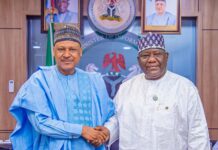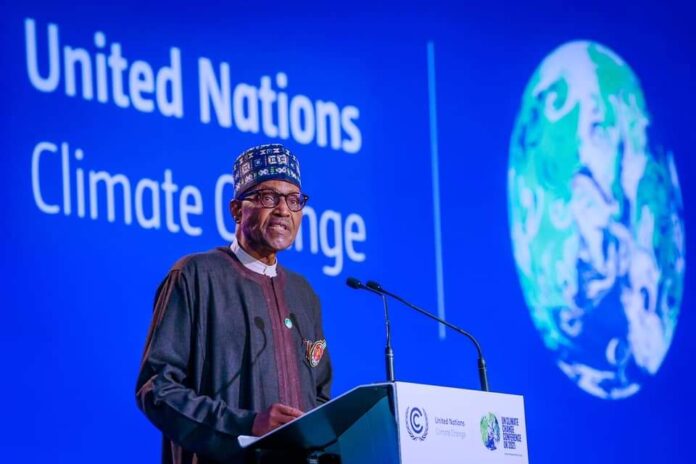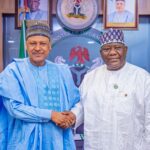President Muhammadu Buhari’s strong, and what many have called activist speech at the opening plenary of the COP-26 climate change summit in Glasgow wasn’t just about the regurgitation of Nigeria’s commitment to climate change but an important message to the rich nations of the world that we in Africa have heard enough of them talking their talk: it’s high time they walked their talk.
Nigeria-as did all the countries in developing world -came here to say we are eager to contribute to a greener planet , even though we are, for all practical purposes, non-emitters – Africa on the overall is responsible for a mere five percent of global emissions – we are nonetheless feeling cheated, oppressed and lied to by the rich nations.
One hundred and twenty Presidents and Heads of government from across the globe came together in Glasgow, Scotland to figure out how to slow down global warming, though disappointingly, some of the world’s biggest emitters, China, with 11 percent contribution to global warming, and Russia did not come in person.
President Buhari’s speech which centred on a number of issues agitating Africa and the developing countries, criticized the rich countries, the major emitters which brought the world’s climate to this sorry state for making promises toward climate finance that till date, have remained hollow.
The President told world leaders that the goal of transitioning from fossil fuel to clean energy, reaching a Net zero ambition for green house emission would require critical infrastructure to be in place in developing countries.
“Parties to the Paris Agreement are expected to transition from fossil fuel to clean energy and reach a Net Zero ambition for greenhouse gases emission.
“We agree that Net Zero ambition can lead to economic transformation across all sectors. It is a good ambition, but it requires critical infrastructure in place, including for renewable energy. Therefore, in Nigeria, it will take us longer time to get to Net Zero,’’ he said.
Making a case for financial support, the President stated that attaining national and global climate change goals would require adequate and sustained technical and financial support to developing countries.
He added that greater efforts should be channelled towards assisting developing countries to meet their Nationally Determined Contributions (NDCs) commitments through the pledges made by the developed countries to provide at least $100 billion yearly.
The Nigerian leader noted that easier access to climate finance had become imperative because of the COVID-19 pandemic, which really battered the economies of developing countries.
The USD 100 billion every year to developing countries signed onto from the Paris 2016 climate change accords, as a promise made by the developed countries, has so far proved to be hollow.
Without coming out to bluntly say so, President Buhari pointed at the hypocrisy of the developed world which, having somewhat reached the goal of energy self-sufficiency by imposing standards that would clearly stunt development in countries such as ours: “May I recall that the phenomenal growth of industrial economies has been driven by access to stable and abundant supply of relatively cheap energy,” said the President.
Another big issue for Nigeria and the continent, which President Buhari trumpeted to the world is that of the planned defunding of fossil fuels.
In practical terms, what this means is the phasing out of coal, which fuels electricity by as much as 70 percent in countries such as India and 86 percent in South Africa; stopping their banks from funding projects in the petroleum sectors including gas and switching to electric vehicles; decarbonising polluting industries like cement and steel; creating forests to absorb carbon dioxide; and installing more solar power plants in a short period of time.
Nigeria’s argument, as put across is, first, we are more of a gas economy than oil. That we are just getting into gas, which by our plans will serve as a vehicle for transition to a cleaner environment. We currently cut down trees for cooking, heating and other energy uses which has exposed us to desertification and the attendant insecurity.
“Nigeria has been a major producer on the world stage for 60 years. My government knew that this was an industry we could no longer ignore, still less close down,’’ the President firmly stated.
The President, who described the consequences of climate change in Nigeria as devastating, said his government has responded by encouraging significant investment in renewable energy in the form of hydroelectric and solar projects.
“We have introduced reforms in the agriculture sector to reduce reliance on imports.
“We have expanded our protected areas by creating ten additional National Parks, and established a 1,500km long green wall across the frontline States to arrest desert encroachment stretching from the Northwest to the Northeast; and we have stepped up implementation of afforestation and reforestation programmes including restoration of coastal/mangrove ecosystem.
“In the area of Energy Access, Nigeria’s commitment to a just transition is reflected in our ambitious Energy Compact, which includes the Government’s flagship project to electrify 5 million households and 25 million people using decentralized solar energy solutions.
“This is a major first step towards closing our energy access deficit by 2030. We also now have a new law to regulate our hydrocarbons sector.”
According to the President, the Petroleum Industry Act recently passed into law is a blueprint that creates the opportunity and incentives for new partnerships to create clean energy.
As the President said in a recent opinion article published by Newsweek on the eve of the Glasgow summit, “there is no single ‘green bullet’ that can be deployed either in Africa or the world that solves concerns of environmentalists whilst simultaneously offering the power to fuel hope of greater wealth and progress for the extra one billion citizens of our African future.
“But there are certain things we can and must do – starting now. We can concentrate on transitioning from fossil fuel power generation that can operate 24 hours a day in all conditions to cleaner production through carbon capture and the conversion of coal and heavy fuel oil power stations to biomass. Equally, we can bring forward new technologies such as mini-hydro power plants which can operate and produce power along shallow waterways without damaging the aquatic life on which local communities are sustained.
“We can also invest in nuclear. Though not renewable it is carbon neutral and capable of producing a baseload, constant electricity production on which sustained economic progress can be built. Nigeria is among a handful of African countries exploring nuclear power, with a research reactor already operational.
“And we can also learn from our friends in Europe and America who do not always practice what they preach. We call on them to lift the moratorium they have placed on fossil fuel investments in Africa. We cannot easily convert gas flaring – a by-product of the oil industry and Nigeria’s single greatest contributor to greenhouse emissions – to energy production without it. There are no such limitations on investment in natural gas power in the West where it is considered a transitional energy source.”
As maintained by the President, mankind has a duty to act on the dangers posed by climate change. But because of its seriousness, we must not do so rashly. It is an inconvenient truth that some of the energy solutions proposed by those most eager to address the climate crisis may fuel the very instability of which they warn. No more clearly can this confluence of unintended consequence with good intention be seen than in Africa.



















